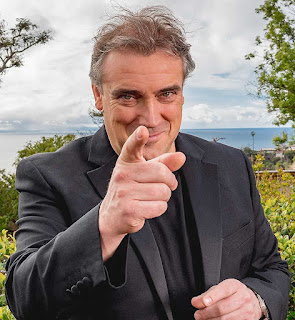Both sides of the pond: ISO's Dvorak's 'New World' and new music from here
 |
| Jaime Martin had good points to make. |
You don't often find a neat thematic tie-in between a concert program containing a symphonic warhorse and quite recent contemporary music. But that's what the Indianapolis Symphony Orchestra is offering this weekend as its "Greetings" series approaches its end along with the 2021-22 Classical Series season.
Spanish guest conductor Jaime Martin bridged any gap successfully Friday night at Hilbert Circle Theatre, drawing from the ISO a brilliant performance of Antonin Dvorak's Symphony No. 9 in E minor ("From the New World") that can sustain comparison with any in my experience. (The program will be repeated at 5:30 this afternoon.)
This is true despite a few awry moments. The first of several chords introducing the "Largo" second movement was ill-coordinated. This series is a perfect introduction to the English-horn solo on one of the repertoire's most famous themes. Like many passages in this familiar work, the chord sequence is heard more than once. But its initial statement must be pristine. Otherwise, the second movement Friday night was full of wonders, including hushed string sonority and the tender framing of Roger Roe's predictably haunting performance.
The famous sigh of farewell at the very end of the work, which the affable Martin was moved to highlight in remarks from the podium, came out more emphatic than he rightly suggested it's supposed to. He even quoted the ending of Longfellow's "Song of Hiawatha," which inspired the composer, to underline the meaning of the fadeout chord after all the finale's brouhaha. It sounded all right, I suppose, just without the special aura Martin had attributed to it. Last quibble: there were more clams here and there from the horn section than we're used to, some of which they managed to turn into grace notes.
You could well suspect Martin of overcueing and even gently mickey-mousing the music. From delicate trills to fierce accents, he had a signal for everything. But the pulse was never in doubt, and he was so fascinating to watch and his movement seemed so natural and ingrained that the connection with the results he got justified everything. I may never have heard a better performance of the Scherzo (third movement). There was a lightness and airiness about everything, the inevitability of dance in those cultures where it is endemic, both that of American Indians and of Dvorak's fellow Bohemians.
I rarely bring up recordings I like in comparison to concerts under review, but the sharp knife edge that George Szell honed on the Cleveland Orchestra was not needed here, and yet the rhythms were well-defined. From the lower strings that launch the work onward, warmth prevailed. Near the end of the Largo, the pauses that interrupt a brief recall of the theme, with the strings at minimum, rendered me surprisingly teary-eyed.
 |
| Ivy Ringel, principal bassoon with ISO |
In contrast, the concert's first half made a virtue out of unfamiliarity. Principal bassoonist Ivy Ringel navigated the rigors of "Ghost of the White Deer," a concerto by Jerod Impichchaachaaha' Tate, with unforced mastery and the ability to compete with a sometimes rambunctious orchestra on equal terms. The work was premiered by the Dallas Symphony Orchestra just before the pandemic interrupted everything. It deserves many performances of this caliber. The composer draws upon his Chickasaw heritage to elaborate on a moving legend of love and violence; the solo instrument seems both a spectral evocation and a flesh-and-blood presence. It covered the full spectrum Friday night.
I was first impressed with Ringel last June because of the character she gave to the lullaby that heralds the triumphant final scene of Stravinsky's "Firebird." Her tone is characteristically full yet rich in nuance, and, both in this concerto and in that "Firebird," totally free of that slightly pinched quality you sometimes hear from double-reed instruments. It blooms and soars.
The concert opened with "Rounds," a multifaceted concerto for piano and string orchestra, by Jessie Montgomery. With a performance history that's only a couple of months old, this piece is about as contemporary as it could be without being a world premiere. Awadagin Pratt, who's on the faculty of the Cincinnati Conservatory of Music and as a young man was heard here in recital and with the ISO, played with the expected flash of technique and imagination that the work calls for.
 |
| Awadagin Pratt brought a wealth of affinities here. |
There is improvisation involved; I'm not sure exactly where, but it seemed to be centered in the solo cadenza. That's where improvisation used to play a role in the classical period. Even when cadenzas are fully written out, they ought to sound improvised. Long ago, a classical critic who covered a jazz concert in Carnegie Hall — it may have been Benny Goodman's fabled 1938 appearance — indicated his disdain for the genre by saying, "It's just about all cadenzas, and I hate cadenzas!" Pratt quoted from the Largo tune that would be heard in the second half in a couple of places, in different registers. It all fit.
Just before the cadenza, there was a passage that reminded me of a David Diamond piece, also titled "Rounds" and also for string orchestra (without concerto-style piano). I don't know if Montgomery was paying an oblique tribute or not. Maybe memory of a piece I last heard on record years ago was playing tricks on me. If so, it was an agreeable trick. The piece stands on its own, in any case, and elicited an ovation that prompted a virtuoso encore: Fred Hersch's Nocturne for the Left Hand Alone. Surely that right hand is coming off the bench to help lead the charge, one is tempted to think. Nope! It's a southpaw spectacle, and Pratt's performance was typical of the thrills this concert offered.



Comments
Post a Comment